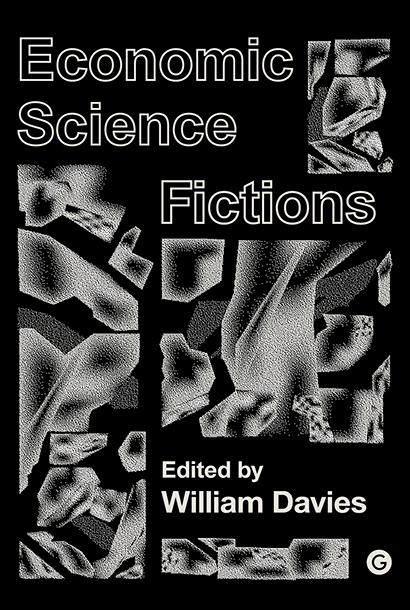William Davies (ed.) Economic Science Fictions (2018)
Filed under book | Tags: · automation, capitalism, dystopia, economics, economy, luddism, money, neoliberalism, science fiction, utopia

“From the libertarian economics of Ayn Rand to Aldous Huxley’s consumerist dystopias, economics and science fiction have often orbited each other. In Economic Science Fictions, editor William Davies has deliberately merged the two worlds, asking how we might harness the power of the utopian imagination to revitalise economic thinking.
Rooted in the sense that our current economic reality is no longer credible or viable, this collection treats our economy as a series of fictions and science fiction as a means of anticipating different economic futures. It asks how science fiction can motivate new approaches to economics and provides surprising new syntheses, merging social science with fiction, design with politics, scholarship with experimental forms.
With an opening chapter from Ha-Joon Chang as well as theory, short stories, and reflections on design, this book challenges and changes the notion that economics and science fiction are worlds apart. The result is a wealth of fresh and unusual perspectives for anyone who believes the economy is too important to be left solely to economists.”
Contributors: AUDINT, Khairani Barokka, Carina Brand, Ha-Joon Chang, Miriam A. Cherry, William Davies, Mark Fisher, Dan Gavshon Brady, Owen Hatherley, Laura Horn, Tim Jackson, Mark R. Johnson, Bastien Kerspern, Nora O Murchú, Justin Pickard, James Pockson, Tobias Revell, Judy Thorne, Sherryl Vint, Georgina Voss, Jo Lindsay Walton, Brian Willems.
Publisher Goldsmiths Press, London, 2018
ISBN 9781906897680, 1906897689
xiv+383 pages
Reviews: Anna Nguyen (LSE Review of Books, 2018), Justin Reynolds (New Socialist, 2018).
PDF (15 MB)
Comment (0)Geert Lovink, Nathaniel Tkacz, Patricia de Vries (eds.): MoneyLab Reader: An Intervention in Digital Economy (2015)
Filed under book | Tags: · bitcoin, commons, crowdfunding, economy, market, money, neoliberalism, technology

“MoneyLab is part of a global movement that demands the democratization of the design of our financial futures. Audacity is essential in times of crisis. And so we must engage constructively with hackers, entrepreneurs, and other creators who take up the call for economic alternatives. One first step is a map of the present: What works and what doesn’t? What is worth pursuing and what must be left aside? Which histories bear on the present moment? And what are the limits of our economic imagination?
The MoneyLab Reader brings developments in crowdfunding, currency design, technologies of payment, and other economic experiments into dialogue. The authors of this volume discuss the implications of the current architecture of global finance, its impact on ever-growing income disparity, and question money and finance as such. It is not always clear, for instance, whether genuine alternatives are unfolding or if we are simply witnessing the creative extension of neoliberalism.”
Contributors: Irwan Abdalloh, Franco ‘Bifo’ Berardi, Robert van Boeschoten, Finn Brunton, Paolo Cirio, Jim Costanzo, Primavera De Filippi, Eduard de Jong, Irina Enache, Andrea Fumagalli, David Golumbia, Max Haiven, Keith Hart, Samer Hassan, Ralph Heidenreich, Stefan Heidenreich, Geert Lovink, Bill Maurer, Rachel O’Dwyer, Pekka Piironen, Lena Rethel, Renée Ridgway, Andrew Ross, Stephanie Rothenberg, Douglas Rushkoff, Saskia Sassen, Inge Ejbye Sørensen, Lana Swartz, Erin B. Taylor, Tiziana Terranova, Nathaniel Tkacz, Pablo Velasco González, Akseli Virtanen and Beat Weber.
Foreword by Saskia Sassen
Publisher Institute of Network Cultures, Amsterdam, 2015
INC Reader series, 10
Creative Commons BY-NC-SA 4.0 Unported License
ISBN 9789082234558
308 pages
Wang Hui: The End of the Revolution: China and the Limits of Modernity (2009)
Filed under book | Tags: · china, confucianism, economy, modernity, neoliberalism, new left, politics

“A compelling examination of the future of Chinese modernity by the leading member of China’s “New Left.”
Challenging both the bureaucratic one-party regime and the Western neoliberal paradigm, China’s leading critic shatters the myth of progress and reflects upon the inheritance of a revolutionary past. In this original and wide-ranging study, Wang Hui examines the roots of China’s social and political problems, and traces the reforms and struggles that have led to the current state of mass depoliticization.
Arguing that China’s revolutionary history and its current liberalization are part of the same discourse of modernity, Wang Hui calls for alternatives to both its capitalist trajectory and its authoritarian past.
From the May Fourth Movement to Tiananmen Square, The End of the Revolution offers a broad discussion of Chinese intellectual history and society, in the hope of forging a new path for China’s future.”
Publisher Verso, London, 2011
ISBN 1844673790, 9781844673797
274 pages
Review: Jeffrey Wasserstrom (Los Angeles Times, 2010).
PDF (updated on 2021-1-25)
Comments (2)
